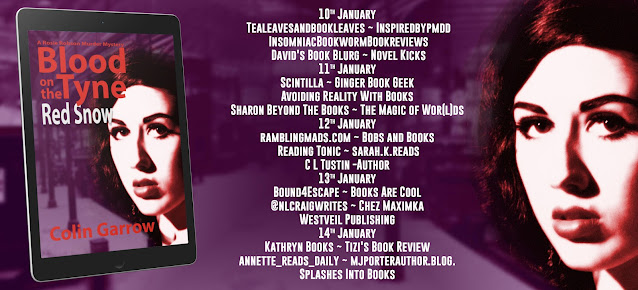I'm thrilled to invite Colin Garrow to my blog today!
Blood on the Tyne: Red Snow (book 3 in the Rosie Robson series).
A dead body. A hoard of forged
banknotes. A gangster out for blood.
Newcastle, December 1955. Returning
home after a weekend away, singer and amateur sleuth Rosie Robson discovers a
man lying on a baggage trolley with his throat cut. After the police get
involved, an attack on Rosie and her boss prompts Inspector Vic Walton to find
a safe house for the pair. But the bad guys seem to be one step ahead of them
and Rosie is forced to track down a possible witness to the murder in a bid to
learn the truth. Can the canny crooner solve the mystery before a Newcastle
gang boss catches up with her?
Set on Tyneside, Blood on the Tyne:
Red Snow is book #3 in the Rosie Robson Murder Mysteries series.
Purchase
Link - https://geni.us/3PKXkN
Author
Bio:
True-born Geordie Colin Garrow grew up in a former mining town in
Northumberland and has worked in a plethora of professions including taxi
driver, antiques dealer, drama facilitator, theatre director and fish
processor. He has also occasionally masqueraded as a pirate. Colin’s published
books include the Watson Letters series, the Terry Bell Mysteries and the Rosie
Robson Murder Mysteries. His short stories have appeared in several literary
mags, including: SN Review, Flash Fiction Magazine, The Grind, A3 Review, Inkapture
and Scribble Magazine. These days he lives in a humble cottage in Northeast
Scotland.
Social
Media Links –
Website
(Adults) https://colingarrow.org/
Website
(Children) https://colingarrowbooks.com/
Amazon
Author Page https://www.amazon.co.uk/-/e/B014Z5DZD4
Twitter
https://twitter.com/colingarrow
Smashwords
https://www.smashwords.com/profile/view/colingarrow
Facebook
https://www.facebook.com/colingarrowthewriter
Guest Post –
What’s All This First Draft Nonsense?
Whenever I
read blogs or Twitter posts by an author who’s just finished the first draft of
their WIP (work in progress), I always wonder if I’m the only person in the world
who thinks first drafts are just another way of saying, ‘what I’ve written is
crap so I’m going to do it all again.’
First of
all, I’m aware that many writers create a first draft to get the basic story
down on paper and develop ideas. It’s also likely that this first version of
the book hasn’t undergone any kind of editing and will be stuffed full of
clunky dialogue, rambling sentences, grammatical gaffs and hundreds of typos. So,
then they write the second draft, working on the structure and sorting out
stuff like conflict and resolution and fixing any plot holes. Those who write
murder mysteries, for example, might want to make sure they’ve given the reader
enough clues to allow them to work out who the killer is while creating a
puzzle that will still leave a surprise at the end.
But I don’t
do any of that.
Why? Because
I practice my craft with a slightly obsessive attention to detail.
In the past,
I’ve tried those techniques where you start writing and ignore typos, gaffs and
anything else that might distract from the story, and power on to the end of
the book. And yes, that would be great if I could do it. But I can’t. My need
to correct my work as I go comes from the same place that screams at me when I
read an email or a text message with misspelled words or missing capital
letters. Instead of concentrating on the message, I want to respond to the
writer with suggestions on how to improve their grammar.
In place of
writing a first and second draft, I write the final draft, correcting and
rewriting as I go along. Admittedly, there will still be typos and grammatical blunders
that depart from what is true, right, or proper. But luckily those will usually
be picked up by my editor. I don’t seem to suffer from problems with the plot,
which I suspect is due to my habit of rereading everything from the beginning
before I start each writing session (obviously I don’t this this so much when
the book has reached thirty or forty-thousand words).
Being a
pantser (an author who writes with no plan or outline), I detest any hint at
knowing how the story will end. Sometimes, of course, I have a sense of how a
particular character or scenario might work out, but often the ending is as
much a surprise to me as to my readers.
The only
problem with this method is that sometimes my lack of planning ties me up in
knots, such as with Terminal Black, the first book in my Relic Black
Thriller series, where I became totally confused by the plot and the ridiculous
number of characters I’d created. But usually, it works out fine. If there
comes a time when it doesn’t, I might have to reconsider, but being a control
freak, I probably won’t.




No comments:
Post a Comment